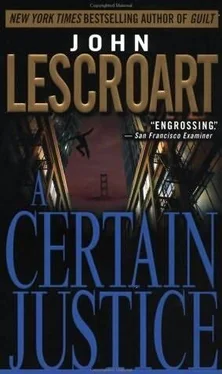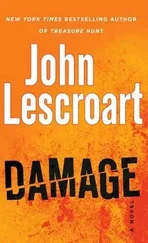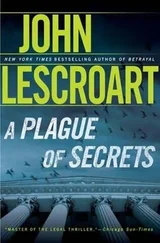John Lescroart - A Certain Justice
Здесь есть возможность читать онлайн «John Lescroart - A Certain Justice» весь текст электронной книги совершенно бесплатно (целиком полную версию без сокращений). В некоторых случаях можно слушать аудио, скачать через торрент в формате fb2 и присутствует краткое содержание. Жанр: Триллер, на английском языке. Описание произведения, (предисловие) а так же отзывы посетителей доступны на портале библиотеки ЛибКат.
- Название:A Certain Justice
- Автор:
- Жанр:
- Год:неизвестен
- ISBN:нет данных
- Рейтинг книги:3 / 5. Голосов: 1
-
Избранное:Добавить в избранное
- Отзывы:
-
Ваша оценка:
- 60
- 1
- 2
- 3
- 4
- 5
A Certain Justice: краткое содержание, описание и аннотация
Предлагаем к чтению аннотацию, описание, краткое содержание или предисловие (зависит от того, что написал сам автор книги «A Certain Justice»). Если вы не нашли необходимую информацию о книге — напишите в комментариях, мы постараемся отыскать её.
A Certain Justice — читать онлайн бесплатно полную книгу (весь текст) целиком
Ниже представлен текст книги, разбитый по страницам. Система сохранения места последней прочитанной страницы, позволяет с удобством читать онлайн бесплатно книгу «A Certain Justice», без необходимости каждый раз заново искать на чём Вы остановились. Поставьте закладку, и сможете в любой момент перейти на страницу, на которой закончили чтение.
Интервал:
Закладка:
'For that age, I'd say yes.'
'And what now?'
Her mother hesitated. 'Now we are friends.'
Elaine had some trouble with this. 'Mom, I have been around you just a little bit, and I have never heard you mention his name before.'
'We lost track of each other, hon. That happens, you know. He had family. So did I.'
'But he couldn't have lost track of you – '
'Because I have a public life? Maybe not. But there was no reason for him to look me up. Now, since the other day, with this… anyway, he interviewed me about Chris…'
Elaine was silent.
'Are you there, hon? You okay?'
'I don't know what I'm going to do.'
'You haven't told anybody, have you? About you and Chris?'
'No, but I think Art Drysdale kind of has a feeling about it. He was here with me for a long time. We talked.'
The words came out carefully. 'Let him have a feeling, Elaine, but don't ever admit it. Would you promise me that?'
'Mom, I wasn't going to…'
'It will give him too much on you. Anybody, in fact…'
'Not Art. He's not-'
'He's your supervisor. If he needs it he'll use it. That's the way the world works. And you, especially – you're not allowed to have a scandal.'
'Mom, it's you who's not allowed to have a scandal. You're the senator. I'm just-'
'No. This isn't for me. I'm thinking about you.'
'Art Drysdale isn't going to say anything. How did we get on this? I don't even care if he does. What matters is Chris.'
Her mother sighed again. 'Chris is gone, hon. You'll find somebody else.' A pause. 'Somebody better for you.'
'I don't want somebody better for me.' Tears threatened again.
'You will, Elaine, believe me. Someday you will.'
44
It might have been interpreted as a nice domestic scene – the clean-shaven young man with the bandaged leg sitting around the coffee table with his parents and their well-dressed friend, all of them listening politely to the overweight blue-collar guy with the heavy black shoes, perhaps a repairman telling them all about the leaking water heater, the pros and cons of getting a new one.
It was turning into a much more formal police interview than Carl Griffin had ever intended.
Colin Devlin was twenty-four years old and still lived with his parents in a renovated Victorian on Clifford Terrace in the upper Ashbury. Griffin had called from Dr Epps's office and reached the young man, asked a couple of cursory questions and got a minimal response, then wondered if he could call on him, have him make a statement about his injury, keeping it all vague. Colin, sounding nervous on the phone, had said okay. Griffin had reasoned he wouldn't have been able to say anything else without creating suspicion, and he was proved right.
On the way to Devlin's, Griffin ran into an area that had been cordoned off by the National guard and had to detour for half a mile. Then, in spite of the eggplant submarine sandwich he'd wolfed at lunchtime, he also suffered a Mac attack and found he needed a burger. So he set no landspeed marks getting up to Ashbury, and by the time he arrived so had the reinforcements – Colin's parents and their lawyer, a Mr Cohen.
In its own way, this was the most positive thing that had happened to Griffin in three days, since even in today's paranoid world most people did not feel the need to call their attorney to be present at an informal police interview over a self-inflicted shoveling accident.
Given Cohen's presence, Griffin was surprised to be admitted to the house without a warrant. The man was probably the father's business lawyer, not a criminal attorney. If that were the case he wouldn't be up on the rules, which Griffin hoped would prove to be bad luck for Colin.
After a few moments of awkwardness, they got settled in the tastefully appointed front room. A pale mid-afternoon sun came and went through the ancient curved windows that lined the circular room. In spite of a low-burning fire in the grate, the whole place felt cool, and Griffin left his coat on, leading with his best shot. Why, he wondered, had Colin felt the need to invite Mr Cohen to this meeting?
The father, Mr Devlin, was a friendly looking dark-haired man in a Donegal tweed suit and regimental tie. Clearly, he was in control. Though Griffin had not addressed him, he answered. 'Inspector Griffin, let's cut through the malarkey here. As I'm sure you suspect – it's why you're here – my son did not cut his leg the way he told Dr Epps. We don't want to go through the charade of having to produce the shovel and… all that nonsense.' He waved a hand.
'All right,' Griffin said. If they were going to give it to him free, he was going to take it. He shifted his bulk in the creaking bentwood chair and leaned forward. 'What happened exactly?'
The wife, a pretty woman with a lot of jewelry, spoke up. 'Colin didn't mean to-'
'Mary, please.' The husband's imperious look stopped Mary Devlin. He went on. 'We would like assurances that Colin's cooperation with the police…' Unsure of the process he was trying to control, he seemed to run out of steam for a moment, then found his rhythm again.'… that there'll be some quid pro quo.'
Griffin was leaning forward, his hands clasped. 'Cutting deals is up to the DA,' he said. 'Most times, they'll talk about it. How'd you get cut, Colin?'
'I don't even know. Some guy behind me…' The boy's eyes were hollow, his face pale as though he'd worn a beard for a long time and had recently cut it. Maybe in the last half hour.
'Colin, just a minute… I don't think we should talk any more unless you can give us some guarantees,' the father said.
Griffin nodded, stalling. 'If Colin here was at the scene of the lynching, his testimony would be very important. I'm sure the DA would recognize that, put it in the mix.'
Mr Devlin chewed on it a moment. 'We're not trying to duck responsibility here – any that might fall to Colin – but I don't want my boy…' He faltered again. 'Being there at all, being part of it, was unpardonable, I understand that…'
'Dad, I-'
'Colin!'
The boy shut up.
'… and I'm sure that we've been too lax, letting him live at home, giving him an allowance, not insisting he go to work, get some job, but his mother… well, that's going to end. The boy has to grow up, take responsibility for what he does, but he has promised us that he did not touch the man, and I absolutely believe him. He never got close to him.'
At last, the lawyer spoke. 'Bren, I think that's enough. Inspector, what do you think?'
'I'll have to talk to someone downtown, but I think they'll be… receptive.'
'What should be our next step?' Mr Devlin asked.
Griffin stood, pulled down his jacket that had ridden up over his middle. 'I don't want you to take this wrong, sir,' he turned to Cohen, 'or you either, but I think you might want to get yourself an attorney who does this for a living. You might find it makes a difference.'
Jamie O'Toole, jobless due to the loss of his workplace to fire, was bitter and angry. Jamie was a man who had lived in the city his entire life, had gone to Saint Ignatius high school and then done a year at San Francisco State, during which Rhoda (the name alone, he should have known), his girlfriend at the time, had gotten pregnant and he'd married her, which had killed five years dead.
Also, it left him without a college degree, which he would have gotten otherwise, he was smart enough. But the breaks just hadn't worked out for him so he could stay in school. So there he was, needing a job – any job – at the beginning of this recession, and he didn't care what they were saying about it in the newspapers, here in California it wasn't getting any better.
So he'd gotten into bartending – decent tips, most of the money under the table, where he could keep it instead of give it to Uncle Sam or, worse, to Rhoda. Guys had told him, 'Don't get so you're making any money on the books, the ex will just come and get the judgment upped.' And he had listened. Rhoda would do that to him, no question. Same as she wouldn't get married, though she was living with some dweeb in Richmond, because then he'd be allowed to stop his alimony. He supposed the child support would just go on forever, more money out of his pocket, another thing holding him down, keeping him where he was.
Читать дальшеИнтервал:
Закладка:
Похожие книги на «A Certain Justice»
Представляем Вашему вниманию похожие книги на «A Certain Justice» списком для выбора. Мы отобрали схожую по названию и смыслу литературу в надежде предоставить читателям больше вариантов отыскать новые, интересные, ещё непрочитанные произведения.
Обсуждение, отзывы о книге «A Certain Justice» и просто собственные мнения читателей. Оставьте ваши комментарии, напишите, что Вы думаете о произведении, его смысле или главных героях. Укажите что конкретно понравилось, а что нет, и почему Вы так считаете.












